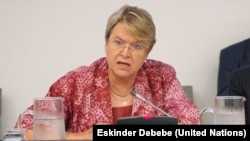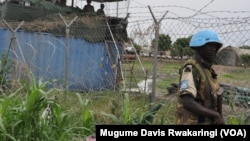The new head of the U.N. Mission in South Sudan (UNMISS), Ellen Margrethe Loej, called Tuesday for "the guns to fall silent" in South Sudan to allow the United Nations and aid agencies to stop focussing on protecting people from violence and start helping the young country to grow.
"We hope that once we get the guns to be silent we can focus on assisting the South Sudanese people in rebuilding -- I shouldn't say rebuilding -- in building and developing this new nation that saw the light of day just three years ago," Loej said at her first news conference since arriving in South Sudan early last month.
UNMISS mandate
But until the leaders on both sides in South Sudan's conflict "make the necessary compromise for peace," Loej said UNMISS will focus on "protection of civilians, monitoring and investigating human rights violations, facilitating the delivery of humanitarian assistance, and support of the implementation of the cessation of hostilities agreement."
That was the revised mandate that the U.N. Security Council gave UNMISS in May. "It's a mandate that does not, I repeat, does not include, as the previous mandate, capacity-building, peace-building and security sector reform," Loej said Tuesday in Juba.
President Salva Kiir asked in his speech to the U.N. General Assembly last month for the Security Council to reconsider the changed mandate and allow UNMISS to go back to helping South Sudan to build its young democracy.
Asked by a reporter if UNMISS would "consider the plea of President Kiir," Loej said that it was not for her to decide.
"The mandate is solely in the hands of the members of the Security Council... it's them that decide that and I'm sure they have all noted what the president said in his statement. I do not know and I cannot tell you what their reaction will be," Loej said.
Getting IDPs to return home
Loej also addressed Mr. Kiir's request in his speech to the General Assembly for UNMISS to "encourage those in UNMISS camps to return to their homes" so that the U.N. can "protect the civilians in their neighborhoods and not in camps..."
"The surge in our troop level is designed to do exactly that," Loej said. She said there are around 10,500 troops in South Sudan, most of them from Ghana, Rwanda and Ethiopia, and with a battalion from China expected to join them. Loej did not say when the Chinese troops might arrive.
"It's very clear in the new mandate that the Security Council directed us to do more frequent and robust patrolling. The force commander... is very, very keen to have his troops move around... to move out of some of the U.N. camps, to be visible in the communities and thereby give a sense hopefully of security," Loej said.
Although UNMISS is having difficulty "getting all out troops on the ground and getting their equipment here... I can promise you, as soon as we have everybody and all the equipment, it will be used," Loej said.
More than 1 million IDPs
Loej said that UNMISS is currently hosting some 96,000 civilians in U.N. camps, and that many more people are internally displaced but not in U.N. facilities.
"UNMISS and humanitarian partners are working very closely on doable and sustainable solutions including encouraging the voluntary, and I underline voluntary return of IDPs to their homes," Loej said.
But until all of South Sudan's displaced feel that they can safely return home, Loej pledged to provide them with protection in "all parts of this huge country where people need protection.”
I really hope for a peace agreement, I really hope for the guns to be silent, I really hope for all of us to be able to focus on a better future for each and every South Sudanese."UNMISS head, Ellen Margrethe Loej
She stressed, however, that primary responsibility for providing protection to civilians lies with the South Sudanese government, the SPLA and the national police force.
Loej takes over at the helm of UNMISS from Hilde Johnson. She previously spent four years as the head of the U.N. peacekeeping mission in Liberia, and retired in 2012.
"But when I was asked if I was interested in going to South Sudan, I couldn't say no, because I felt that if I could contribute to assist the people of this new nation to succeed, it would be wrong of me to say I shouldn't use the experience I have," she said.
"I really hope for a peace agreement, I really hope for the guns to be silent, I really hope for all of us to be able to focus on a better future for each and every South Sudanese," Loej said.






